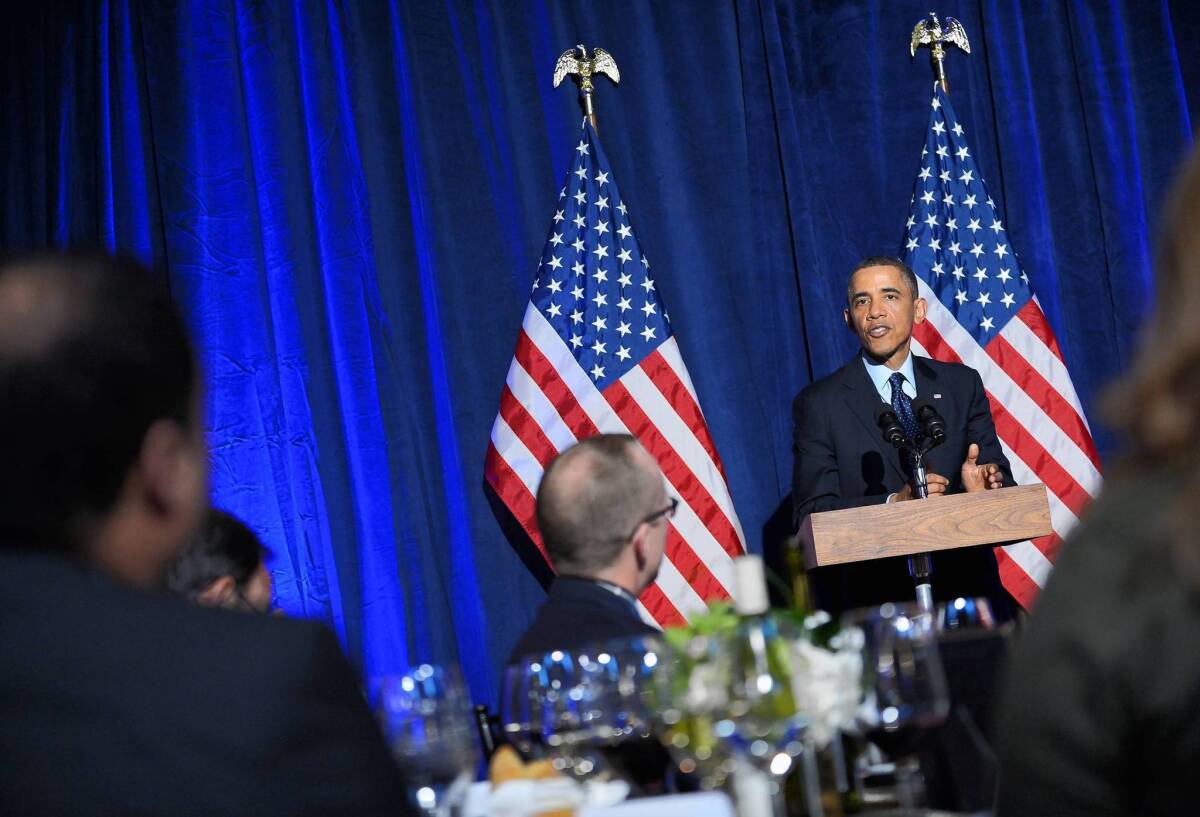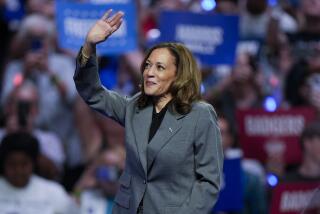Obama meets with new advocacy group

- Share via
WASHINGTON — President Obama on Wednesday cemented his relationship with a new advocacy group set up to back his second-term agenda, underscoring the unprecedented role the nonprofit is playing as an outside arm of the White House.
In his first speech to Organizing for Action since its January launch, Obama urged former campaign donors, staff and volunteers to channel their resources and energy into the new entity.
“The only idea here that we’re promoting is the notion that if the American people are speaking out, organized, activated, that may give space here in Washington to do the kind of work — hopefully bipartisan work — that’s required,” Obama said at the group’s two-day “founders summit.” “But in order to do that I’m going to need all your help.”
Hours after courting House Republicans on Capitol Hill, the president said Congress also needed to be pressured from the outside.
“The politics of a lot of these issues are tough, and members sometimes are scared about making the right decisions,” he told about 75 backers at a closed-door dinner at an upscale hotel two blocks from the White House. Among those in attendance was Google Chairman Eric Schmidt, an advisor and donor.
Although the White House has said the president would interact with Organizing for Action the same way he does with other supportive organizations, Obama’s appearance put a spotlight on the group’s unique position. Guided by his longtime aides, the organization is drawing on his campaign’s data, technology and staff as it seeks to build a grass-roots force to back him on issues such as gun control, immigration reform and the budget.
“If Americans don’t organize to support the issues they believe in, and if we don’t help them do it, then lobbyists and special interests will drive Washington, just like they did for decades,” Jim Messina, chairman of Organizing for Action and Obama’s former campaign manager, told the gathering.
During his remarks, Obama said part of the impetus for the group was to avoid the mistake made after his 2008 campaign, when “some of that energy just kind of dissipated, and we were only playing an inside game.”
It remains to be seen whether Obama’s supporters will be effective on Capitol Hill.
The president’s personal involvement will be key to keeping his 2.2 million campaign volunteers engaged, activists said. Sue Langley, a 64-year-old supporter from Vienna, Va., said that after seeing Obama speak, she would be able “to go back home and reassure our volunteers that he is going to be with us for the long haul.”
Even as Organizing for Action ramps up plans to run sustained issue campaigns, which will start next week, it has come under fire for its ties to Obama and his former campaign operation.
Set up under Section 501(c)4 of the tax code as a “social welfare” organization, the group can raise unlimited sums and is already coordinating with the White House, as permitted by law.
Obama stayed for two hours at the Organizing for Action dinner, whose attendees included wealthy donors who had been asked to give $50,000 each. During meetings last month between the group’s leaders and top campaign fundraisers, the idea was floated to name those who raise $500,000 a year to an advisory board that would meet quarterly with the president.
Campaign finance watchdogs have assailed the organization, arguing that it could serve as a conduit for special interests seeking to influence the administration. To blunt the criticism, Organizing for Action last week reversed its decision to accept money from corporations, a move that could severely hamper its fundraising.
On Wednesday, neither the president nor the group’s leaders addressed the controversy directly. But David Plouffe, Obama’s longtime political strategist, said in an opening speech that Organizing for Action “is something that should be celebrated, not criticized.”
“Just the notion that there’s millions of Americans that want to be part of these debates … that in my mind is reason enough to march forward,” he said.
Officials said the group was a vehicle for average Americans to engage with their government.
“We are not a partisan organization,” said Executive Director Jon Carson. “We are here to move this shared progressive agenda forward, and we will advocate to Democrats to move that forward, we will advocate to Republicans.”
Obama noted that the group had been met with some “suspicion,” but insisted that it was not created to boost Democrats in the 2014 midterm election.
“I actually just want to govern — at least for a couple of years,” he said.
Still, there were no Democrats among the 13 lawmakers targeted in the group’s first online ad campaign last month to pressure congressional Republicans to support universal background checks for gun buyers.
And as the group starts campaigns on gun control and the federal budget, it is sharing resources and strategy with organizations allied with the political left, such as the Center for American Progress, Mayors Against Illegal Guns, the AFL-CIO and the Service Employees International Union.
Democratic leaders said that by keeping Obama’s supporters energized, the group would be a boon to the party.
“Organizing for Action is going to be involved in making sure we keep our grass-roots activists engaged, and then they will be turned loose on the campaigns in 2014 and help us win the majority in the House back,” Rep. Debbie Wasserman Schultz, chairwoman of the Democratic National Committee, told MSNBC this week.
Whether the pro-Obama group can harness its resources to shape the messy process of passing legislation remains to be seen. There are already signs that the group’s campaign-style tactics could run at cross-purposes with a stepped-up White House effort to court GOP support for Obama’s initiatives.
The group recently sent emails to supporters blasting congressional Republicans as obstructionists on the budget, even as Obama was reaching out to them to find what he calls a “common-sense caucus.” Among those Obama has contacted are Sens. Susan Collins of Maine and Kelly Ayotte of New Hampshire — two of the lawmakers Organizing for Action has publicly pressured to support stronger gun control measures.
More to Read
Sign up for Essential California
The most important California stories and recommendations in your inbox every morning.
You may occasionally receive promotional content from the Los Angeles Times.













